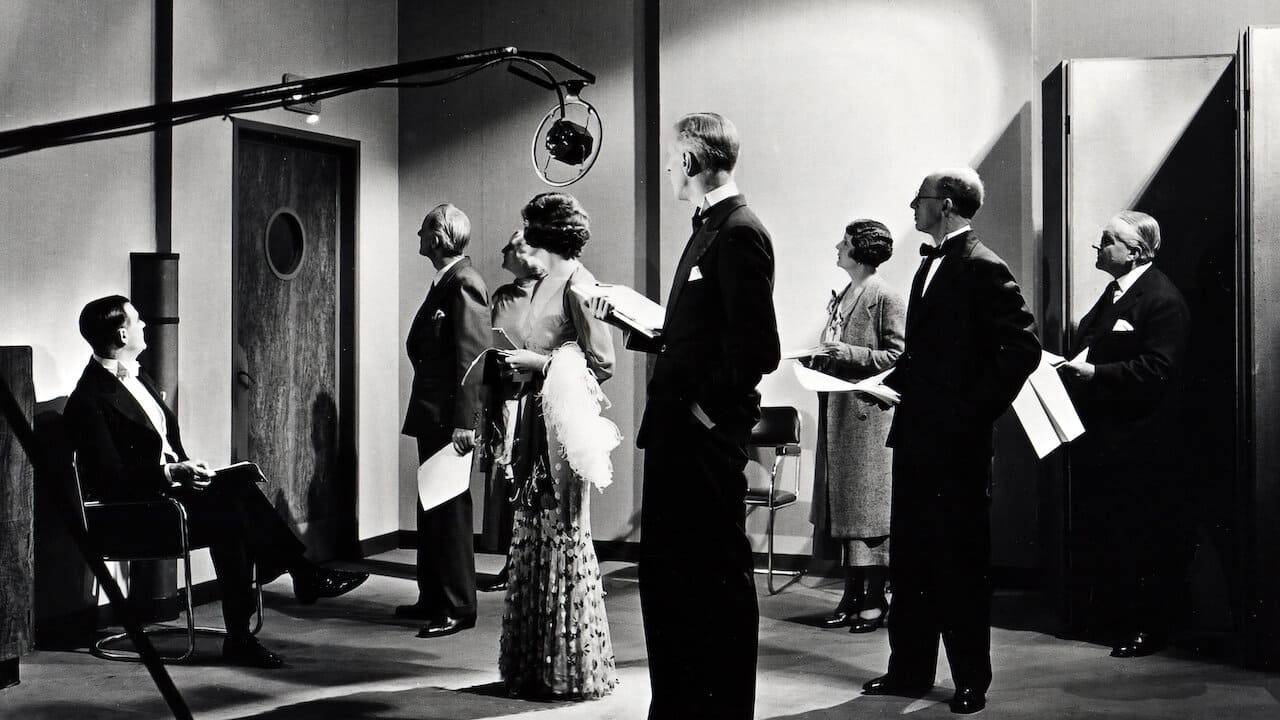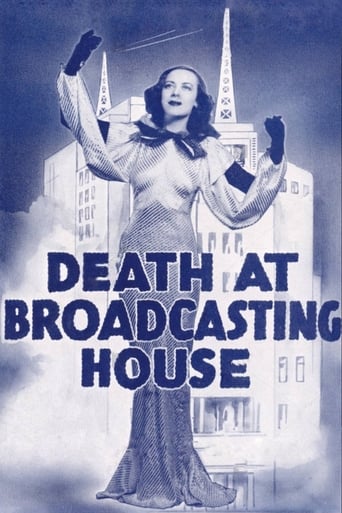

I like the storyline of this show,it attract me so much
... View MoreOverrated
... View MoreThis movie tries so hard to be funny, yet it falls flat every time. Just another example of recycled ideas repackaged with women in an attempt to appeal to a certain audience.
... View MoreBlistering performances.
... View MoreIt's great to see inside Art Deco Broadcasting House soon after it was built. It looks like a set from The Shape of Things to Come, while the male characters all wear faultless evening dress (not changed much since 1900) after six, and the ladies wear the rather frilly and fluffy fashions of the time.It is also illuminating if you are a fan of the detective stories of Ngaio Marsh, particularly Enter a Murderer (set in a theatre). Here we have the still rather melodramatic acting conventions, and a leading lady with a carefully genteel accent who strikes poses and delivers speeches in private life.Stock characters abound: the "silly ass" who gets lost on the way to the Variety show. (He's a terrible bore, though supposed to be funny.) Fortunately he hooks up with Miss Poppy Levene, a wise-cracking chorus girl who is going to get a few diamond bracelets out of him. She really is funny.Val Gielgud as the abrasive producer, explaining that you need to co-ordinate several studios to get "aural ambiance" or some such.The playwright, who is always ready with a Wildean wisecrack, puts literary characters like Lord Peter Wimsey and Inspector Alleyn in the context of their times.The gentlemen are unforgivably rude to "inferiors". As one of the doormen helps the leading actor on with his coat, the thespian snaps "Stop annoying me!" I rather liked Donald Wolfit as the bounder who is snubbed by the rest of the cast - shame he gets strangled so early.We get a good view of the chorus line rehearsing and performing just so that their taps could be heard behind the dance band.
... View MoreThis is pretty fascinating stuff on a number of levels: the then visualisation of radio broadcasting for cinema audiences, the then limitations of radio and cinema technology, a frank and snappy dialogue, some wonderful art deco furniture and sets, the great Elizabeth Welch singing, and an all too brief song from Eve Becke and whichever band Percival Mackay was leading at the time. And the BBC for once apparently received no complaints after twenty five million people had listened to a live radio strangulation. Probably Lord Reith would have at least apologised.A radio actor is murdered during a live broadcast, the cast and crew are therefore suspect – and the hunt by Detective Inspector Ian Hunter is soon on for the culprit in a short and swift film. The perceived interiors of Broadcasting House looked flimsier than the acting but the unmasking of the dastard involved a cast-iron alibi being broken. It's one thing knowing that back then BBC radio newsreaders were booted and suited or in full evening gowns with no one to see them but another to have scantily-clad showgirls performing mainly for the edification of the microphones. Maybe it's a BBC trait! There's a young heavily eye-shadowed Jack Hawkins in here, Henry Kendall was as urbane as ever, and Donald Wolfit had a small - but vital - part in one of his first films. Many iconic poses were struck with many nice scenes. What a pity all BBC broadcasts weren't preserved on steel tape, never mind about for the Empire but for the broadcastless future generations - over the years many BBC radio shows survived only on transcription discs meant for foreign consumption.If I wanted to be awkward I could add that I personally think genuine talent and honest morality have both been strangled to death at the obese Broadcasting House over the last eighty years too and because of this no one has therefore logically seen fit to make a movie about it. But I'm glad this was made - it's still a refreshing atmospheric whodunit and something to make you think!
... View MoreSince having notice my dad pick up an increasing number of TV shows and films from a DVD company called Network,I decided to take a look at movies that the company has released,which led to me stumbling upon a Film Noir murder-mystery set in the-then newly built BBC studios,which led to me getting ready to take a dangerous tour of the beeb's broadcasting house.The plot:Rehearsing a radio play that is to be aired/played later that day,a group of actors find them selves becoming increasingly annoyed with the show's lead producer,due to him constantly demanding the cast to put more "life" into their performance.Being the only actor who seems happy with the way that the producer is treating him, (which leads to the other cast members being even more annoyed) Sydney Parsons enters a sound booth to play the part of the first murder victim.As Parsons begins to read a page in the script that involves his character being killed,a strange pair of hands wrap around Parsons neck,and strangle him to death.Rushing to congratulate Parsons on his amazingly realistic performance,the producer soon discovers that instead of life being brought into the play,a sound of death has been sent across the airwaves.View on the film:Before getting to the movie,I have to mention that whilst the film does have some snap,crackle & Pop,Network have given the 80 year title a clear,crisp picture,and a smooth soundtrack that allows for this deadly radio recording to be fully heard.Opening with a low-lit close up shot of a radio mic,director Reginald Denham gives the movie a frosty Film Noir atmosphere by using close up side angles to create an uneasy feeling of anyone of the cast being Sydney Parsons (played by a very good Donald Wolfit) deadly cast member.Whilst the title does have some nice moments of each cast member being set to stab the other in the back,the screenplay by writer/actor Val Gielgud, (who also wrote the novel that the title is adapted from)Basil Mason and Eric Maschwitz sadly decides to focus on the rather dry inner workings of the studio production,instead of the wonderfully cynical Film Noir aspects,which leads to this broadcast being one that is not played in a prime time slot.
... View MoreThis has real curio value for anyone interested in the early days of respectively radio and sound film. Val Gielgud who co-authored the screenplay unwisely allocated himself a leading role which explains all too well why he is best remembered as a producer. It remains a fascinating glimpse of Broadcasting House as it (presumably) was and the exhausting rehearsals undergone by a dance troupe (on radio) underline the Reithian standards that once obtained (including, of course, newscasters in full evening dress. We also learn where MGM got the idea of filming Lena Horne is stand-alone segments that cut be cut seamlessly when a film played in the Deep South; here Elizabeth Welch has a similar isolated sequence bearing no relation to the plot; she walks in, sings a song, Lazy Lady, and walks out again. This is her sole contribution to the film and quickly and easily removable as and when necessary. Donald Wolfit plays the luckless 'ham' actor (surely a comment on his theatrical appearances)who is killed for real on air whilst Jack Hawkins weighs in with a performance mannered beyond belief. One from the 'so- bad-it's-good' school and none the worse for it.
... View More